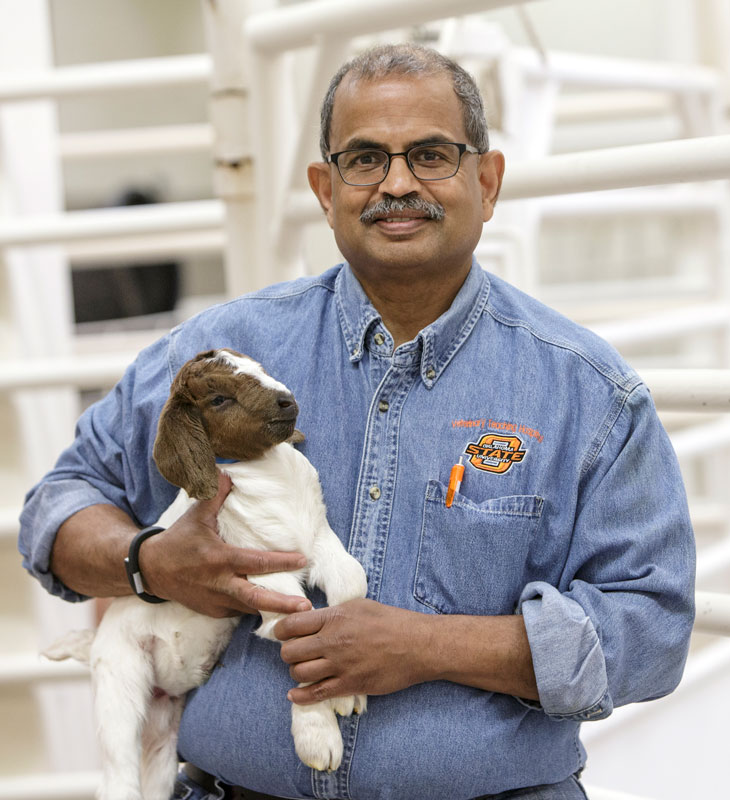
Dawson Named Regents Distinguished Teacher
Tuesday, December 14, 2021
Dr. Lionel Dawson with Oklahoma State University’s College of Veterinary Medicine recently earned a 2021 Regents Distinguished Teaching Award.
A professor in the college’s Department of Veterinary Clinical Sciences, Dawson has been teaching for 39 years.
“I was very surprised and honored to be nominated and receive this prestigious award. Being recognized by my peers, other faculty members and students is a great honor. I think this will be a highlight of my teaching career," Dawson said.
Dawson became interested in animals at an early age. Growing up in India, the family did not have refrigeration. Every morning for years, a farmer would milk his cow outside their front door and sell them a liter of milk. Dawson often thought if the farmer could produce more milk, he could provide more people with milk and make more income.
Dawson also suffered a dog bite when he was 10. Rabies was prevalent in India and they did not know who owned the dog. Dawson underwent 14 injections every day for a week, which were very painful. In the hospital’s isolation wing, he could hear and see people showing signs of rabies with no treatment available, which had him thinking that there needed to be something to prevent so much exposure from animals to humans.
Dawson now teaches veterinary students in all four years of the curriculum. Inspired by his mother, who was an elementary school English teacher in India, he envied her patience, caring and helpfulness to her students. While serving as a captain and coach of his high school soccer and cricket teams, Dawson realized his role as a mentor as he enjoyed teaching and explaining details to his team members.
“It is amazing to see the enthusiasm and dedication among students when they come into vet school,” he said. “The first year they are stressed out, so I try to get them to open up, talk and relax in the course I teach. I try to remember their names. By the second year, I can see dramatic changes in their thought process, learning style and comfort level with their friends. I see more patience and confidence in themselves. Third year, I give them more responsibilities and critical thinking on clinical cases.
"When they graduate, most of them are confident in knowledge and clinical skills, and are prepared to go into practice. I like to see the gradual transformation from first year to fourth year, and I’m very happy how they later become good citizens and responsible veterinarians when they leave.”
Specializing in reproduction and working with all farm animals, Dawson found his niche in his mid-career working with small ruminants at Langston University.
“I did a lot of my work in goat reproduction and herd health at Langston. Because of my niche in small ruminants, I had the opportunity to travel all over the world to developing countries like Malaysia, India, Armenia, Egypt and a number of countries in Africa to spread my small ruminant knowledge to farmers, faculty and students," Dawson said. "I also was involved in a Farmer to Farmer program in Malawi, Southern Africa, teaching farmers efficient production of meat and milk in goats. Through the information I have shared, I have helped to improve small ruminant health in general all over the world, which I think is my greatest accomplishment.”
Dawson hopes to be remembered as a mentor, teacher and friend for life. He still tries to keep up with all of his former students who have graduated since 1983.
“For young faculty members, I would advise them to get a very good mentor,” he said. “Mentorship is very important. Dr. Larry Rice was my boss and a very good mentor who made me feel at home here at OSU. He provided me with advice to succeed in academia. Young faculty need to meet with their mentors on a weekly basis, so they can give you some advice and direction. In addition, communicating and collaborating with other clinicians in the hospital and researchers is very important. I was fortunate to collaborate with colleagues in the OSU Animal Science Department and at Langston University.”
Dawson has accrued many favorite memories throughout his teaching career at the veterinary college, but three come to mind.
“I love teaching bovine palpation skills and still teach it. I always tell the students the motto of my course is, ‘No fetus can beat us,’ which they always remember," he said. "For about 25 years, I worked with the Department of Corrections. Every month, I would take a group of students to the maximum-security prison at McAlester, Oklahoma. It was a long day leaving at 5 a.m. and returning late at night but a good learning experience. I taught them how to do regular herd health and palpation. I love teaching labs to the freshman students regarding small ruminant husbandry, examination skills and castration.
"Getting them out of the classroom and giving them hands-on experience was my goal. They perform this task during their first semester of veterinary school, and they remember that experience the rest of their life. Those are my favorite memories at OSU.”
Of course, Dawson credits others who helped him along his journey.
“I thank all of my mentors who have developed me into a good citizen and veterinarian and my colleagues, residents, interns and students who have supported me throughout my career," he said. "I also need to thank my wife, Dr. Karen Dawson (OSU CVM ’85). She wanted to practice in a bigger city, but ended up staying here in Stillwater where she had a clinic for 35 years. She helped me stay in academia.
"I want to thank my department heads and deans throughout my journey for giving me the encouragement and motivation that has enabled me to keep going every day.”
